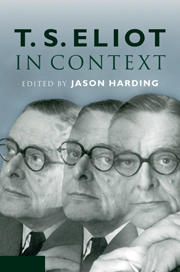Book contents
- Frontmatter
- Contents
- List of illustrations
- List of contributors
- Acknowledgements
- List of abbreviations
- Introduction
- PART ONE LIFE
- PART TWO FORMS
- 7 The role of intellectual
- 8 Publishing
- 9 Censorship
- 10 Literary journalism
- 11 Visual art
- 12 Dance
- 13 Drama
- 14 Music
- 15 Radio
- PART THREE LITERARY CROSS-CURRENTS
- PART FOUR POLITICS, SOCIETY AND CULTURE
- PART FIVE RECEPTION
- Further reading
- Index
15 - Radio
Published online by Cambridge University Press: 05 August 2012
- Frontmatter
- Contents
- List of illustrations
- List of contributors
- Acknowledgements
- List of abbreviations
- Introduction
- PART ONE LIFE
- PART TWO FORMS
- 7 The role of intellectual
- 8 Publishing
- 9 Censorship
- 10 Literary journalism
- 11 Visual art
- 12 Dance
- 13 Drama
- 14 Music
- 15 Radio
- PART THREE LITERARY CROSS-CURRENTS
- PART FOUR POLITICS, SOCIETY AND CULTURE
- PART FIVE RECEPTION
- Further reading
- Index
Summary
T. S. Eliot's something-less-than-a-manifesto for the Criterion, ‘The Idea of a Literary Review’, modestly affirms that ‘a review should be an organ of documentation’. But this documentation must extend beyond the ‘narrowly literary’, not least because of ‘the impossibility of defining the frontiers, or limiting the context of “literature”’. Documenting something more than the tastes of the editor, in this extension the serious review reflects instead the relations among ‘editor, collaborators, and occasional contributors’; these relations must issue in a ‘“tendency” rather than a “programme”’. The object of this documentary project is ultimately Arnoldian, aiming to reveal neither the vision of the editor nor the life of letters, but rather the relative health or disease of culture itself. The ‘literary’ review that Eliot imagined and planned could not, in other words, be strictly literary. Consider, then, the following segue – a segue at once as set up and as seemingly arbitrary as any between segments on a radio broadcast.
In the first of his Criterion ‘Verse Chronicles’ (April 1933), the Imagist poet F. S. Flint opened by discerning ‘no reason why this review should have a verse chronicle … Verse is an obsolete or obsolescent, dead and moribund art, except for musical comedies and drawing-room ballads, and, mercifully, the “art” here is drowned out by the “music”’. Flint's subsequent chronicles recurred to this posture often enough that it became a kind of refrain – and eventually material for something new.
Information
- Type
- Chapter
- Information
- T. S. Eliot in Context , pp. 145 - 154Publisher: Cambridge University PressPrint publication year: 2011
